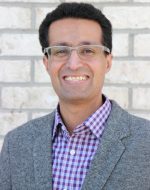Board of Trustees

Aaron Spevack
Aaron Spevack specializes in Islamic Intellectual History, with an emphasis on 13th-19th-century law, theology, and Sufism and their reception in contemporary Muslim communities. He has published two books and a number of articles on Islamic intellectual history including The Archetypal Sunni Scholar: Law, Theology, and Mysticism in the Synthesis of al-Bajuri (SUNY, 2014.) His most recent article, Defending Definitions: The Tools of Disputation in the Logic of al-Fanari, was published in the Methodos journal in 2022. He is currently working on an annotated translation and study of Mulla Fanari’s Fawa’id al-Fanariyya, which is an advanced commentary on the science of logic. Since 2011, he has taught courses on Islam, Islamic Finance, and World Religions in Harvard’s Division of Continuing Education. He has also taught at BU, Hamilton College, Colgate University, and Loyola University New Orleans. He was a Visiting Scholar in Harvard’s Near Eastern Languages and Civilizations from 2019-2021 and continues his research affiliation currently as a Research Associate. Previously, he has been a visiting researcher in Harvard Law School’s Program in Islamic Law where he worked on Talfiq (legal patch-working) in Inheritance, Divorce, and Islamic Finance. He serves as Editor-in-Chief for the Journal of Islamic Philosophy, the ASIPT Online Journal, and the ASIPT Series on Islamic Philosophy and Theology with Lockwood Press. In 2020, he co-founded the American Society of Islamic Philosophy and Theology with support from the Templeton Foundation, and currently leads a research team in Brandeis University’s Near Eastern and Judaic Studies who are producing various resources for their Verification and Renewal Curriculum. In addition to research and teaching, he serves as Muslim Chaplain for the Brandeis and BU Muslim communities.
Muhammad Hozein
Muhammad Hozein is a scholar of Islamic Philosophy & al-Ghazali, maintaining the website www.ghazali.org. He is an editor of the Journal of Islamic Philosophy and a specialist in both English and Arabic typesetting.

Macksood Aftab
Dr. Macksood Aftab is a physician and a philosopher. He is currently chairman of radiology at Ascension General Hospital near Flint, Michigan. He is assistant clinical professor at three medical schools: MSU, CMU and ATSU and is actively involved in teaching and research. He completed his neuroradiology training and master’s in history of science at the Harvard Medical School and Harvard Extension School respectively. He studied philosophy at the University of Michigan, Ann Arbor and at the International Islamic University in Malaysia. Dr. Aftab is a founding editor for the Journal of Islamic Philosophy and founder of the Iqbal Symposium on Islamic Thought and Civilization at the University of Michigan, Flint.
Advisory Board
Khalil Abdur-Rashid
Imam Dr. Khalil Abdur-Rashid is the first full-time University Muslim Chaplain at Harvard University, Instructor of Muslim Studies at Harvard Divinity School, and Public Policy Lecturer at the Harvard Kennedy School of Government. He has taught numerous courses on Islam and Islamic law at NYU and Columbia University and taught Arabic language at Georgia State University. He was the first paid Muslim Chaplain for Columbia University and Barnard College in New York City and served as an advisor to the NYPD Police Commissioner. He also served as Imam for several years in New York City and several years as Scholar-in-Residence at a major Islamic Center in North Dallas. He serves the entire Muslim community at Harvard University though his mentoring, programs, lectures, interfaith work, and the courses he offers in the Divinity School and Kennedy School of Government.
Safaruk Chowdhury
Dr. Chowdhury’s research interests in addition to Sufism at the moment are in paraconsistent logic, metaphysics, ethics and epistemology with keen interest in how these subjects were clarified and explicated within Islamic theological doctrine – especially within kalam theology. Saf is currently lead researcher on the project Beyond Foundationalism: New Horizons in Muslim Analytic Theology funded under a John Templeton Foundation grant award in association with Cambridge Muslim College and Aziz Foundation.
Sharif El-Tobgui
Carl Sharif El-Tobgui holds a B.S. in Arabic Language from Georgetown University and a Master’s and Ph.D. in Islamic Studies from McGill University and currently serves as Associate Professor Arabic & Islamic Studies and Director of the Arabic Language Program at Brandeis. He previously taught for five years at Harvard University as Preceptor of Arabic and has also taught at the Middlebury College Summer Arabic Language School. Prof. El-Tobgui’s scholarly expertise lies in the field of Islamic thought, with a concentration on theology, law, and jurisprudence.
Celene Ibrahim
Dr. Celene Ibrahim is the author of Women and Gender in the Qur’an (Oxford University Press 2020) as well as Islam and Monotheism (Cambridge University Press 2022). She is the editor of the book One Nation, Indivisible: Seeking Liberty and Justice from the Pulpit to the Streets (Wipf & Stock, 2019). Ibrahim’s articles on Islamic theology, Islamic family law, spiritual care, and interreligious studies have appeared in dozens of academic publications. Ibrahim earned a doctorate from Brandeis University, a master’s degree from Harvard University, and a bachelor’s degree from Princeton University.
Suheil Laher
Suheil serves as Faculty Associate in Qur’anic Studies at Hartford Seminary. He conducts research in Islamic theology, law, Quran and hadith studies, and has published academic articles, book chapters, encyclopedia articles, and scholarly translations, including two articles in a collected volume published as a concerned Muslim response to and condemnation of terrorism. He has taught at a number of universities and other educational institutes in the United States, including a leading role at Fawakih Institute for Classical Arabic, and he has presented at academic conferences in the US and abroad.
Najah Nadi
Dr. Najah Nadi’s research interests include: the history and development of Islamic law and legal theories; fatwas and fatwa institutions; Islamic intellectual history; logic and dialectics; professional ethics and exegesis of the Qur’ān. She has contributed to academic and professional projects covering some of these interests. Najah has been a junior fellow at the Holberg seminar on Islamic history at Princeton University since 2015. Dr Najah is primarily a lecturer and researcher at Cambridge Muslim College and also teaches a course on Logic and Kalām at Ebrahim College.
Jawad Qureshi
Dr. Jawad Qureshi is a scholar of Islamic studies with field specialties in Religious Studies Theory and Method, Islamic Revival and Reform, Islamic Theological and Philosophical Thought, Sufism, and Qur’anic Studies. At Zaytuna College, he has taught graduate courses in Arabic Logic, Theology 1, Theology 2, Theology 3, and Research Methods in Islamic Studies.
Omar Qureshi
Omar Qureshi is currently the provost and assistant professor of Islamic Law and Theology at Zaytuna College, which he joined in August 2017. After obtaining his Bachelor of Arts in Microbiology, he went on to complete his M.Ed. in Curriculum and Instruction – Science Education both from the University of Missouri – Columbia. Prior to Zaytuna College, for seven years Omar served as the principal and dean of academics for a parochial school located in Chicago’s West suburbs.
Feryal Salem
Dr. Feryal Salem is Associate Professor of Arabic and Islamic Studies, as well as Director of the Master of Divinity in Islamic Studies and Muslim Chaplaincy programs at the American Islamic College. Her research interests include Islamic philosophy and theology in the post-classical period, interfaith dialogue, and the development of Muslim thought in the contemporary era as it came into conversation with aspects of modernity.
Mustafa Styer
Mustafa Styer is an American-born, Oxford University-trained educator and researcher of Islamic Philosophy. Specializing in curriculum development from the University of London, Mustafa has devoted many years in developing an Islamic education curriculum in the UK. He has worked as head-teacher, deputy head, curriculum coordinator, and a teacher trainer in tarbiya for the Association of Muslim Schools UK established by Yusuf Islam.
Masuk Yamac
Mr. Mahsuk Yamac is a scholar of the classical Islamic sciences with licenses to teach in all pertinent knowledges. His field specialties include Islamic Philosophy and the Liberal Arts, Arabic Grammar and Morphology, Logic, Argumentation Theory (Ādāb al-Baḩth wa-l-Munāẓara), and the Science of Lexical Semantics and Word-Coinage (‘ilm al-wad’). At Zaytuna College, Mr. Yamac has taught Islamic Philosophy 1 (Hidāyat al-Ḥikma), Islamic Philosophy 2-3-4 (Bidāyat al-Ḥikma), Arabic Grammar (Iẓhār al-Asrār).
Research Specialists
Justin Poe
Justin Poe is a student of the Islamic sciences. He completed a B.A. in English Language and Literature from Stevenson University and thereafter pursued sacred knowledge full-time. He studied in Baltimore for four years under Shaykh Yaseen Shaikh at Masjid al-Rahmah’s ʿālimiyya program, and then transferred to Darussalam Seminary in Lombard, IL and completed his studies under the eminent teachers and guides in the full-time seminary program. He remained in Chicago for another year to study at Darul Qasim, taking courses in their Advanced Islamic Studies program. Afterward, he pursued post-graduate studies and attended Zaytuna College’s M.A. program in Islamic Texts, with a concentration in theology and philosophy, graduating in May of 2022. He now works full-time as a research specialist at Brandeis University under ASIPT’s director, Dr. Aaron Spevack, and teaches locally at INK Baltimore Seminary.
Marwan Tayyan
Marwan Tayyan has an M.A. in Islamic texts from Zaytuna College, where he studied advanced Arabic texts in the classical Islamic kalām and falsafa trad
Staff
Michaela Spampinato
Michaela Spampinato is the Project Coordinator for ASIPT and Managing Editor of the The Journal of Islamic Philosophy. In addition to her work here, she teaches First Year Writing at Babson College. She has a Bachelor’s Degree in English and Spanish from Wesleyan University and a Master of Fine Arts in Creative Writing from New Mexico State University. She writes fiction in her spare time. Her book Who I Thought You Were is forthcoming from the Permanent Press.
